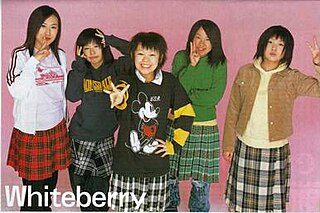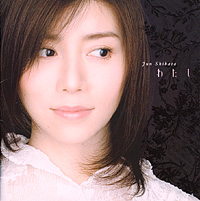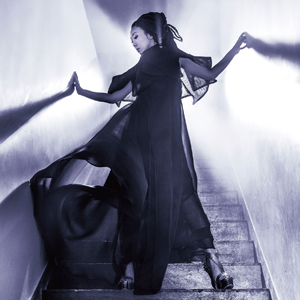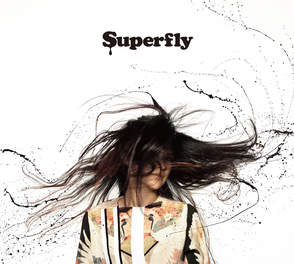Development
"White Summer and Green Bicycle, Red Hair with Black Guitar." is based on Sawao Yamanaka's lonely adolescence growing up in Hokkaidō. [1] This viewpoint is most clearly reflected in the third verse.
I've long been accustomed
To the loneliness
I don't really feel sorrow
These tears are only a pretense
Despite this, Yamanaka has stated that he wrote "White Summer" for the group and not as a personal song for himself, saying, "I just make music for life." [2]
Out of about four songs from the demo album The Pillows was working on at the time, [b] "Babylon Verses of Angel" was Yamanaka's choice for the single release. [2] However, the director, producer, and others pushed for "White Summer". [2] Since the original version has a minute and a half intro, it had to be cut down for its single release. [2] It was for this reason that Yamanaka was initially opposed to "White Summer" as a single, as "Babylon Verses of Angel" would not have required editing. [2]

The Pillows are a Japanese alternative rock band formed in 1989. The group has released 22 studio albums, several EPs and compilations, and over 40 singles. Outside Japan, they are best known as the group responsible for the soundtrack to the FLCL OVA series.

Whiteberry (ホワイトベリー) were a five-piece all-girl pop/rock band from Kitami, Hokkaido, Japan. Although not reaching more than cult status outside of their native country, the group gained a loyal following with their recordings and live performances.
Momoe Yamaguchi is a Japanese former singer, actress, and idol whose career lasted from 1972 to 1980. Often simply referred to by her given name "Momoe," Yamaguchi is one of the most successful singers in Japanese music, releasing 32 singles, including three number one hits, and 21 studio albums. She also starred in 15 feature films and several television serial dramas. At age 21, Yamaguchi retired at the height of her popularity to marry her frequent costar, Tomokazu Miura; she has never performed or made a public appearance since. Therefore, she is called a legendary idol in Japan.

Thank You, My Twilight is an album released by The Pillows on October 23, 2002. The song "Biscuit Hammer" contains a reference to The Great Dictator, Charlie Chaplin's first film to employ spoken dialog. The titular song is featured in several episodes of FLCL Progressive and FLCL Alternative.
Kagerou was a Japanese visual kei rock band, formed in September 1999 by vocalist Daisuke and bassist Masaya, with guitarist Yuana joining shortly afterward. In 2000 Kagerou left their record label Loop Ash to sign with Lizard, a sub-label of Free-Will. After experiencing success within Japan, the band set their sights abroad and in 2005 they played in both Germany and France.
Buzy was a Japanese female pop music group, made up of members Nao Toyama, Mayumi Niwa, Mao Miyazato, Yurisa Asama, Sachiko Iwanaga and Yumi Takeda. They released their first single "Kujira" in 2004. They are well known for the song "Be Somewhere", used as the opening theme of the anime series Rockman EXE Stream, back in 2005. They also performed the opening theme song for Twin Spica, "Venus Say", a version of "Kujira" with different lyrics. The group's name stands for "Blend, Unique, Zipping, and You just wait." Many of their songs were written and composed by Porno Graffitti guitarist and lyricist Haruichi Shindou. Buzy disbanded in June 2006. Members Nao, Mayumi and Mao went on to form MANSAKU with former Boystyle members Kayoko and Yukina.
Yozuca*, stylised in all lowercase, is a Japanese female singer. She performs songs mainly for games and anime and is known especially for her vocal contributions to the Da Capo series. Her debut was in 2002 with the song "Da Capo: dai-2 botan no chikai", used as the theme song for the adult PC game D.C.: Da Capo. She works under Peak A Soul+, and most of her works are released by Lantis.
Megamasso was a Japanese visual kei rock band. Their sound was lively and upbeat, with a unique mix of punk, piano ballads and pop rock.
Lunkhead (ランクヘッド) is a Japanese rock band signed under Victor Entertainment and is managed by Chockyu co. ltd. The band played its first show during their high school graduation ceremony in 1999.
Miyoko Asada is a Japanese actress. She is a former pop idol.

Watashi (Me) is Jun Shibata's fourth and last studio album with Dreamusic. It was released on March 30, 2005 and peaked at number 6 in Japan.
Triplane is a Japanese rock band who has released multiple singles and albums, as well as performed songs for the soundtracks of anime, dramas, and other Japanese programming. "Moving Heart" off of their most recent album and single has been used as the ending theme for Tomica Hero: Rescue Force. Previously, their single "Dear Friends" was used as the ending theme for One Piece episodes 246 through 255.
Kenji Ueda is a Japanese rock musician and producer. He is known for his solo work, as well as his work with Kenzi & The Trips and The Pillows.

The Night Without a Guide is the studio album by Japanese singer-songwriter Yosui Inoue, released in November 1992.

"Kimi wa Jitensha Watashi wa Densha de Kitaku" is the 18th major single by the Japanese idol group Cute, was released in Japan on April 18, 2012. It is Cute's first ballad single.

Axia is the debut studio album from Yuki Saito, released on June 21, 1985 by Canyon Records. It reached #6 on the Oricon charts, and has been repackaged and rereleased twice. It contains six original songs and four which had previously been released as singles.

Shiroi Honō is the second single from Japanese singer Yuki Saito. The single was released by Canyon Records on May 21, 1985, and was used as the theme song for the first Sukeban Deka television drama series on Fuji TV, in which Saito also played the main character, Saki Asamiya.

"Shiroi Kisetsu" is a song recorded by Japanese singer Misia, from the album Love Bebop. It was released as the album's lead single digitally on February 4, 2015, through Ariola Japan. It was released as a limited double A-side CD single alongside the song "Sakura Hitohira" a week later, on February 18, 2015. The song was co-written by her0ism and Yuuki Idei, and arranged and produced by her0ism. The song is featured as theme song on the soundtrack of the EX drama series Second Love starring Kazuya Kamenashi and Kyoko Fukada. The limited physical release includes a piano rendition of "Shiroi Kisetsu" as a hidden track.

"Kuroi Shizuku" is a song by Japanese musical act Superfly. Used as the theme song for the Fuji Television medical drama Mutsū: Mieru Me, it was released as a digital single on November 18, 2015, and as a physical single on December 2 as "Kuroi Shizuku" & Coupling Songs: 'Side B', a five-song extended play packaged with a B-side compilation album as a bonus disc.

"Watashi ga Obasan ni Natte mo" is the 16th single by Japanese singer/songwriter Chisato Moritaka. Written by Moritaka and Hideo Saitō, the single was released by Warner Music Japan on June 25, 1992.












